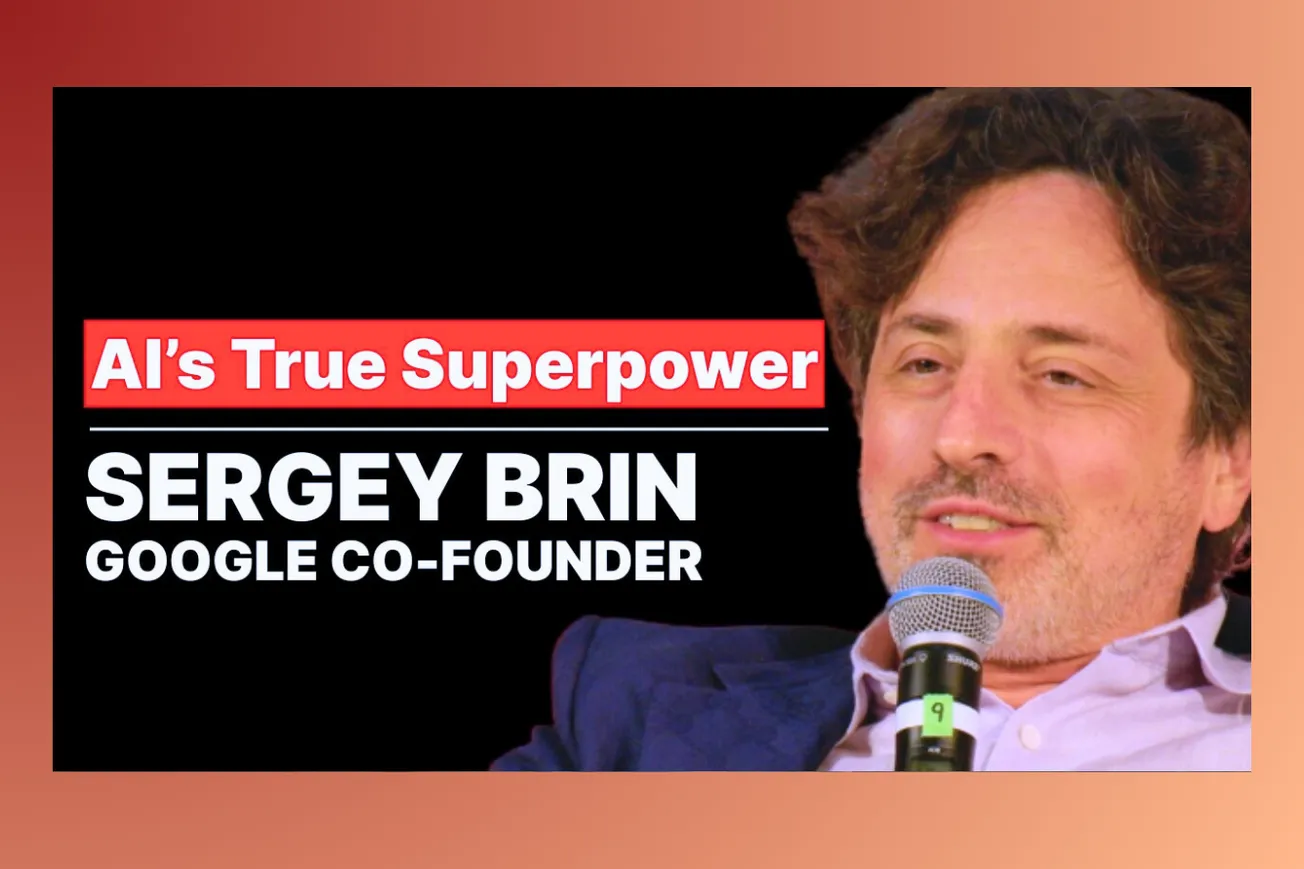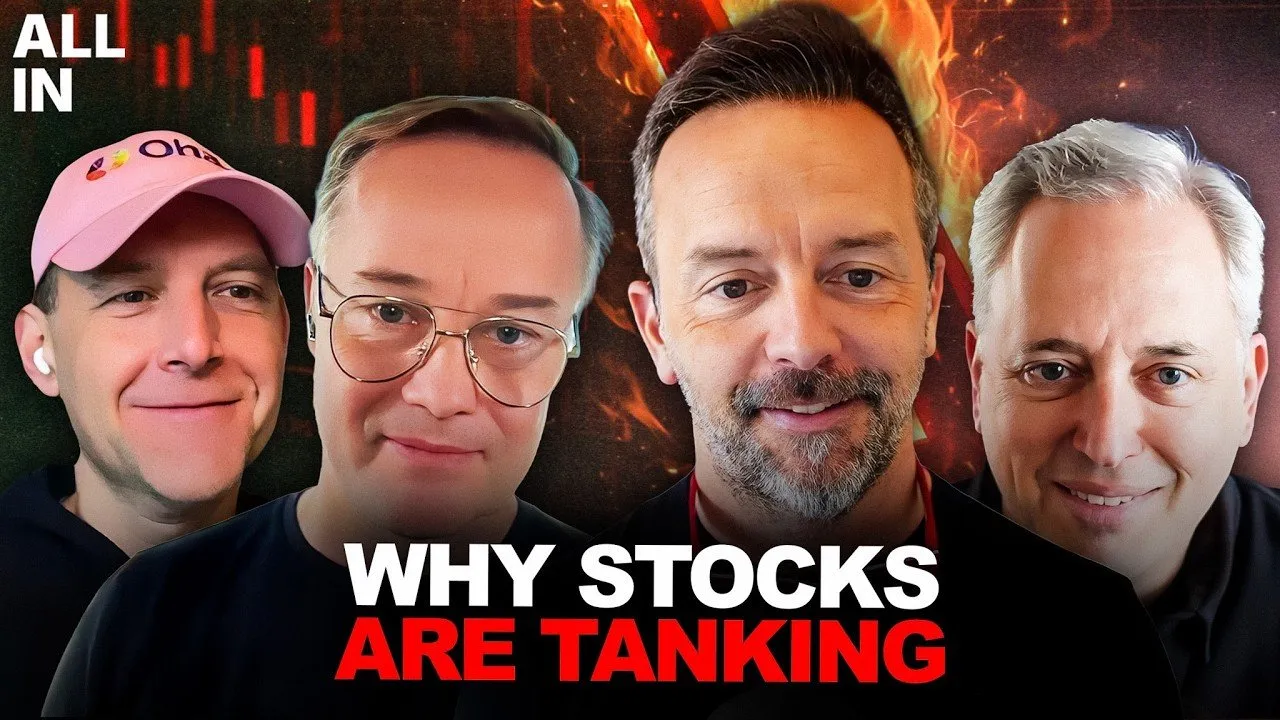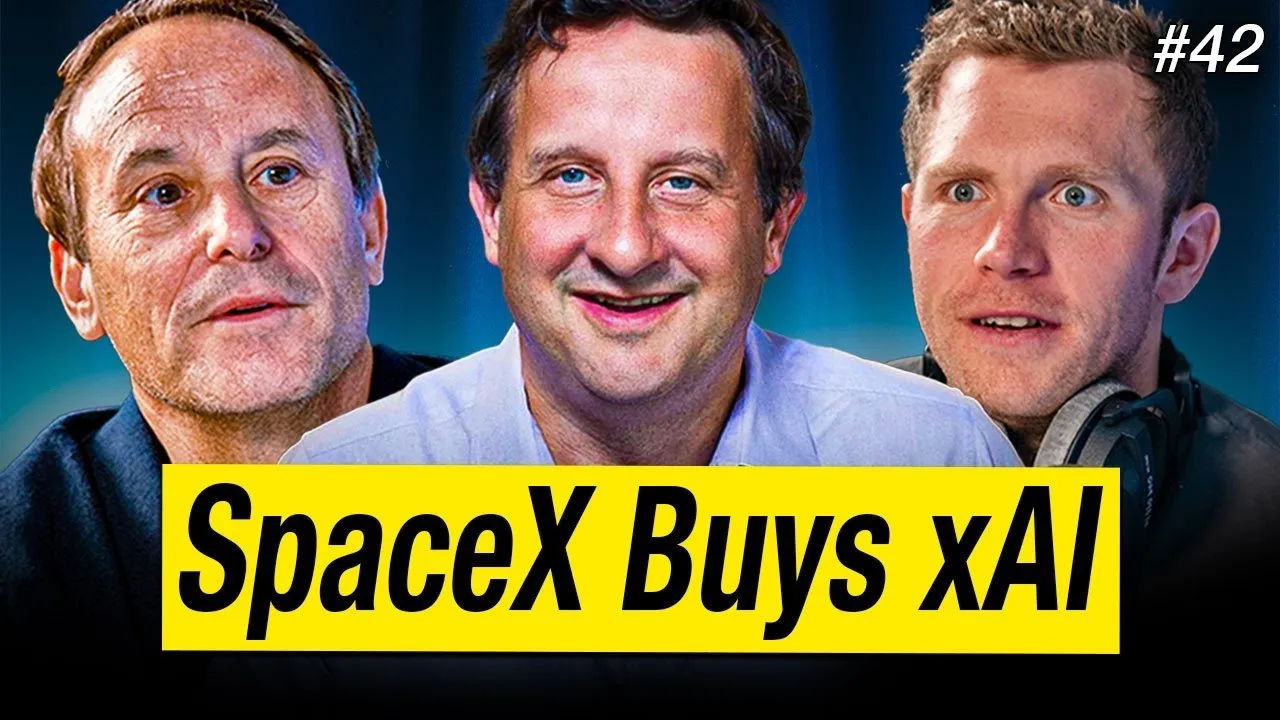Table of Contents
Explore Google Co-Founder Sergey Brin's unexpected return to the forefront of technology, driven by the unprecedented acceleration of AI development. This insightful interview delves into AI's "true superpower" in scaling human capabilities, its transformative impact on robotics and foundational models, and the evolving dynamics of human-computer interaction. Discover Brin's candid perspectives on the future of work, education, and the ongoing debate between open-source and proprietary AI.
Key Takeaways
- Driven by AI's Pace: Sergey Brin's return to active involvement at Google was spurred by the astonishing and accelerating pace of AI development, which he considers the most exciting technological shift of his career.
- AI's Superpower is Scale: The true strength of AI lies in its ability to perform tasks at a volume and depth far beyond human capacity, such as analyzing thousands of search results to derive complex insights.
- Evolving Human-Computer Interaction: The future of interaction with AI is moving beyond traditional search boxes to more intuitive methods like voice commands and potentially direct neural interfaces, with a focus on immediate, contextual responses.
- Rethinking Education and Work: The rapid advancement of AI prompts fundamental questions about the purpose of traditional education (e.g., college) and the future of human roles, suggesting a shift towards tasks requiring social adjustment, psychological resilience, and exploration rather than rote knowledge.
- The Future of Foundational Models: While there's a trend towards converging general models, specialized AI models for domains like chip design or biology will continue to be valuable for targeted iteration, with learnings eventually integrating into broader models.
- Robotics at an Inflection Point: While past efforts in robotics faced software limitations, the current advancements in AI's ability to learn from visual and sensory information are creating a new era of potential for robotic systems, though Brin remains less bullish on the humanoid form factor.
- Open-Source vs. Closed-Source: The debate between open-source and proprietary AI models continues, with powerful open-source releases closing the gap, and Google actively pursuing both approaches.
- Internal Culture and Bureaucracy: Brin humorously recounts navigating Google's internal bureaucracy, highlighting the importance of a healthy culture that allows for questioning and dissent, even from junior employees.
Timeline Overview
- 0:00 - 0:40 - The Besties welcome Sergey Brin!: The hosts introduce Google Co-Founder Sergey Brin as a special guest for an insightful discussion on artificial intelligence.
- 0:40 - 5:58 - Sergey on his return to Google, and how an OpenAI employee played a role!: Brin discusses his unexpected return to active work at Google after a period of theoretical retirement, spurred by an encounter with an OpenAI employee who highlighted the transformative nature of current AI advancements.
- 5:58 - 12:23 - AI's true superpower and the next jump: Brin elaborates on what he perceives as AI's most significant capability – its capacity to process and analyze vast quantities of information at a scale unattainable by humans, and speculates on subsequent leaps in AI's intelligence.
- 12:23 - 17:07 - AI robotics: humanoids and other form factors: A discussion on the evolving landscape of AI-powered robotics, considering the viability of humanoid designs versus other specialized form factors and the current state of software integration.
- 17:07 - 19:59 - Future of foundational models and open-source: Brin offers his perspective on whether the number of foundational AI models will proliferate or converge, and shares his thoughts on the ongoing philosophical debate between open-source and proprietary AI development.
- 19:59 - 31:09 - Human-computer interaction in the age of AI: An exploration of how individuals will interact with computing systems as AI progresses, moving beyond traditional search interfaces to more intuitive and integrated methods like voice, and potentially direct neural interfaces.
- 31:09 - End - Partner shoutouts: Thanks to OKX, Circle, Polymarket, Solana, BVNK, and Google Cloud!: Acknowledgment of various partners supporting the "All-In Live" event.
The Besties welcome Sergey Brin!
The "All-In Live" event in Miami commenced with a significant announcement: the presence of Sergey Brin, Google's Co-Founder, as a special guest. The hosts humorously acknowledged his renewed active involvement, with one noting, "Somebody told me you... started submitting code and it kind of freaked everybody out that daddy was hungry." This lighthearted exchange set the tone for a candid discussion with Brin, hinting at his deeper engagement with Google's current technological frontiers, particularly in artificial intelligence. The playful comment about "Management is like the easiest thing to do with AI" further underscored the central theme of the event: the transformative impact of AI on various domains, including organizational dynamics.
Sergey on his return to Google, and how an OpenAI employee played a role!
Sergey Brin's return to active engagement at Google was an unexpected development, occurring shortly after he had, in theory, retired a month before the COVID-19 pandemic. His initial post-retirement intention was to pursue personal interests, such as "hang out in cafes, read physics books." However, the unfolding global events quickly rendered this impractical.
A pivotal moment that influenced his return was an encounter with Dan, an employee from OpenAI, at a small gathering. Dan emphasized the unprecedented nature of the current AI revolution, stating, "this is like the greatest transformative moment in computer science ever." This statement resonated deeply with Brin, a computer scientist by training. While humorously noting he hadn't yet completed his PhD, Brin conceded that Dan was correct. His subsequent immersion in AI technology proved "incredible," confirming his assessment that the "exponential nature of this, the pace of it dwarfs anything we've seen in our career." He elaborated, "it's almost like everything we did over the last 30 or 40 years has led up to this moment and it's all compounding on itself."
Brin contrasted the current AI pace with past technological shifts. While the early web, with its rapid growth from "what's new" pages to mainstream adoption, was exciting, AI's development is "just astonishing." He explained that while the web spread quickly, its underlying technology didn't fundamentally change month-to-month. In contrast, "these AI systems actually changed quite a lot... if you went away somewhere for a month and you came back you'd be like whoa what happened." His recent code submissions, though minor, were driven by a desire to "go deep into every little pocket" of the system, ensuring he understood the technology firsthand. He humorously recounted navigating company bureaucracy to gain access to necessary tools, highlighting a cultural dynamic where even a founder encounters internal resistance—a sign he interprets as a "healthy culture."
Brin's primary focus shifted from "pre-training" models, which involve massive computational efforts, to "post-training," particularly with the emergence of "thinking models." This progression represents a significant leap in AI's general capabilities, leaving him to ponder, "we don't really know what the ceiling is."
AI's true superpower and the next jump
Sergey Brin articulated that AI's genuine "superpower" lies in its ability to execute tasks at a scale and volume that far exceed human capacity. While current AI systems can efficiently process and summarize the top ten search results—a task a human could eventually replicate, albeit slower—their true value emerges when they "suck down the top... thousand results and then does follow on searches for each of those and reads them deeply." Such an undertaking would constitute "a week of work" for a human, rendering it practically unfeasible.
He cited a specific example from his experience with Gemini's "deep research" feature. When prompted with a complex query regarding Formula 1 deaths per mile driven, a task initially deemed "really hard," the AI, once given permission to make its "best shot," meticulously processed vast amounts of data. It accounted for variables like practice miles and ultimately provided an estimated death rate, reminiscent of a detailed undergraduate term paper, all within minutes. This capability to synthesize extensive, disparate information rapidly is what Brin considers truly transformative.
Reflecting on these "amazing" moments of AI capability, Brin considered the implications for the next generation, specifically his own children in high school and middle school. He acknowledged the AI's current proficiency in subjects like math and coding, where it can "win like math contests and coding contests... against... top humans." This observation leads to a profound question about the future of education: if AI can master such skills, "what is the AI going to be inact" by the time his son enters college?
This technological shift compels a re-evaluation of traditional educational paths. Brin noted that college was already facing questions about its value, with debates on vocational training versus traditional academic pursuits. AI further intensifies these questions, prompting him to wonder if traditional college is still the optimal path. His perspective as a parent has evolved; while he once would have "panicked" about his son's focus on an SEC school for its culture, he now views it as potentially "the best thing you could do." This is because such an environment fosters critical non-academic skills: "Be socially well adjusted, psychologically deal with different kinds of failures, you know enjoy a few years of exploration." This suggests a future where human skills, less easily replicated by AI, become paramount.
AI robotics: humanoids and other form factors
Sergey Brin addressed the evolution of AI robotics, a field where Google has had extensive, albeit sometimes challenging, involvement, having "acquired and later sold like five or so robotics companies," including Boston Dynamics. He reflected that while the hardware in these endeavors was often impressive, the "software wasn't quite there" to make the robots truly useful.
Regarding the prominent trend of humanoid robots, Brin expressed a degree of skepticism, confessing, "I'm probably the one weirdo who doesn't who's not a big fan of humanoids." His hesitation stems from past experiences, as Google had "acquired at least two humanoid robotics startups and later sold them." The primary rationale for pursuing humanoid forms, he acknowledged, is that "the world is kind of designed around this form factor," facilitating training on existing human-centric data like YouTube videos. However, Brin contended that this approach might "not [give] the AI quite enough credit." He believes AI possesses the inherent capacity to "learn... through simulation and through real life pretty quickly how to handle different situations," without strictly needing the same number of limbs or locomotion as humans. Despite his personal reservations, he conceded that "a lot of really smart people who are making humanoid robots," making it a trend not to be entirely discounted.
The conversation then shifted to the future of programming in the age of AI. Brin discussed the impact of AI on developer productivity, particularly within Google's extensive 20-year-old codebase. He humorously recounted an internal "tiff" where Google's own Gemini AI was initially on a "no list" for internal coding use due to "weird reasons." After a "shocking period of time" and his direct intervention, this restriction was lifted, highlighting the bureaucratic challenges even founders face. Brin emphasized that using AI tools demonstrably increases his own productivity. The larger question remains whether all developers will reach a "10x" productivity level or if computers will eventually handle most coding, with humans primarily responsible for verification.
Future of foundational models and open-source
Sergey Brin pondered the future trajectory of foundational AI models, acknowledging the uncertainty in predicting whether they will proliferate into highly specialized versions or continue to converge into more general capabilities. He observed a historical trend within machine learning towards convergence, citing the dominance of "transformers" over various specialized network architectures for vision, text, and speech. Increasingly, he noted, the field is moving towards "one model."
While acknowledging the scientific utility of specialized models for targeted iteration and faster development, Brin asserted that "we are generally able to after we do that take those learnings and basically put that capability into a general model." Consequently, the long-term benefit of highly specialized foundational models is limited, offering only marginal advantages in speed or cost.
The discussion then moved to the philosophical debate between open-source and closed-source AI. Brin commended Deepseek for releasing a "surprisingly powerful model" that "closed the gap to proprietary models," indicating a shift in the landscape. Google itself has pursued both avenues, releasing "Gemma," a series of "open-source or... open models" that perform well and are designed to run efficiently on single computers. While Gemma models are not as powerful as Google's proprietary Gemini, Brin suggested that the ultimate trajectory of the open-source versus closed-source dynamic remains uncertain, adding that the jury's still out.
Human-computer interaction in the age of AI
Sergey Brin provided insights into the evolving paradigm of human-computer interaction in the age of AI, moving significantly beyond the traditional search box model he helped popularize. He envisions a future where interactions shift from typing keywords or questions and clicking links to more intuitive methods, such as "speaking to a AirPod or thinking," with answers delivered directly, potentially through spoken responses.
He referenced the recent breakthrough designation for Neuralink's human brain interface as a significant step towards direct neural interaction, though he noted the considerable regulatory hurdles involved in widespread implantation. When asked about the most common human-computer interaction model in the next decade, he acknowledged the potential of glasses with integrated screens, a concept Google explored with Google Glass. Brin candidly admitted that Google Glass "kind of messed that up," citing poor timing and technological immaturity. However, he believes the technology is now "more sensible," despite lingering battery life issues.
The accelerating pace of AI development, with some experts predicting the "singularity" within five years, makes long-term predictions challenging. Brin shared his personal experience with AI's growing capabilities, particularly in his own areas of expertise like math and coding. He finds himself increasingly relying on AI as a tool, acknowledging a subtle shift in his own capabilities without it causing personal distress, though he pondered if this perspective might change as AI becomes even more capable.
Brin also humorously revealed an unexpected application of AI: "management is like the easiest thing to do with the AI." He described an internal AI tool at Google that could summarize extensive chat discussions, assign tasks, and even identify individuals for promotion based on their contributions. He recounted a specific instance where the AI highlighted a young engineer's contributions, leading to her manager acknowledging her hard work and a potential promotion. This demonstrated AI's ability to act as a powerful analytical assistant, even in nuanced human-centric tasks.
He confirmed the significant value of "infinite context length" for AI models, especially for handling massive codebases like Google's. This capability, combined with "multiple sessions," allows for complex, sustained interactions. Brin revealed that Google is actively "pushing all the bounds" in terms of AI intelligence, context, and speed.
Regarding hardware, Brin clarified that Google primarily relies on its own custom-designed TPUs (Tensor Processing Units) for Gemini's foundational models. However, they also utilize and purchase a significant number of Nvidia chips, making them available to customers through Google Cloud. He emphasized that at this stage, the abstraction layer for hardware remains complex, requiring careful consideration of chip architecture, memory, and communication due to the immense computational demands of AI models. He anticipates that AI itself might eventually abstract these hardware complexities.
Brin also discussed the shift towards voice-based interactions, noting that he frequently uses voice chat on his mobile device due to its newfound speed. He highlighted the "Minority Report"-like capability of AI to provide rapid, responsive feedback. He also touched upon the emergence of "compartmentalization," where specialized foundational models for tasks like text-to-speech (e.g., Eleven Labs) or speech-to-text (e.g., Whisper) are stacked to create highly effective, albeit slightly higher latency, end-to-end systems. Looking ahead, he envisions AI becoming even more intuitive, with systems that can perceive user reactions via camera and adjust their responses accordingly, creating a more seamless and empathetic interaction.









